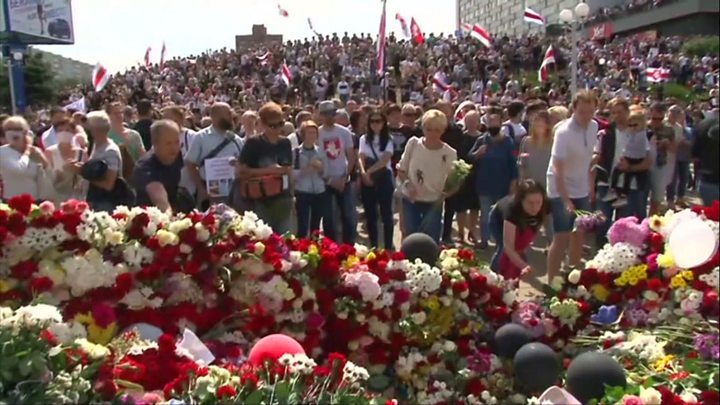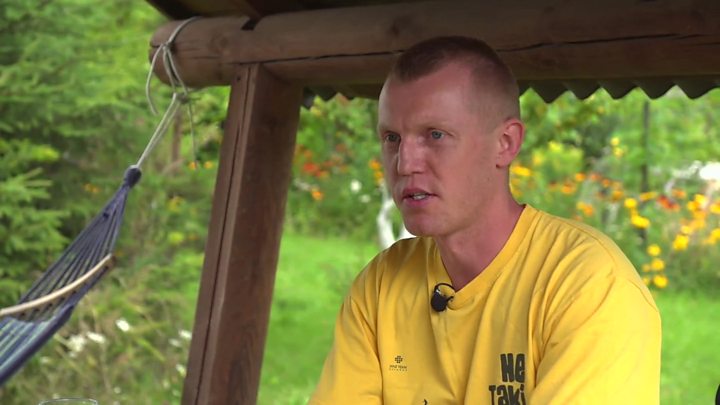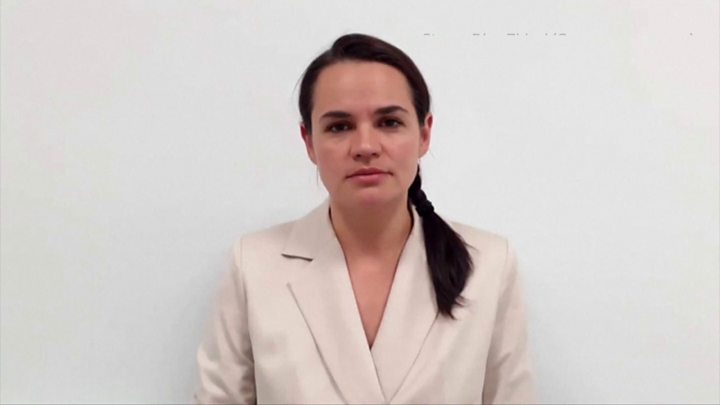
Media playback is unsupported on your device
Thousands of people have gathered outside the state television station in Belarus demanding full coverage of protests against the disputed presidential election.
Opposition supporters outside the building in Minsk held banners with signs saying "show people the truth".
Mass protests erupted after President Alexander Lukashenko claimed a landslide victory in the 9 August vote.
The state broadcaster initially chose not to cover the protests.
The election result has been condemned with widespread allegations of vote-rigging.
The Central Election Commission says Mr Lukashenko, who has been in power since 1994, won 80.1% of the vote and the main opposition candidate Svetlana Tikhanovskaya 10.12%.
But Ms Tikhanovskaya insists that where votes were properly counted, she won support ranging from 60% to 70%.
Image copyright Reuters Image caption Thousands complained that the state broadcaster gave a skewed picture of the protestsOn election day, Belarusian state channels aired the voices of Lukashenko supporters and did not cover the demonstrations. State TV later showed footage of violence to blame protesters and warn people not to participate.
Several journalists have resigned over the coverage.

Media playback is unsupported on your device
On Friday, European Union foreign ministers agreed to prepare new sanctions against Belarusian officials responsible for "falsification". The US has also condemned the election as "not free and fair".
And on Saturday, three Baltic states called for the vote to be re-run.
What's the latest with the protests?
Some 100 staff came out of the state television building to join the protests and said they planned a strike on Monday, AFP news agency reports. Others have signed a letter in support of a strike.
"Like everyone we are demanding free elections and the release of those detained at mass protests," one employee, Andrei Yaroshevich, told AFP.
Mr Lukashenko's press secretary Natalya Eismont and senate speaker Natalya Kochanova arrived at the broadcast centre to meet staff, to shouts of "shame" from the crowd gathered outside.
Earlier on Saturday, thousands of people waved flags, lit candles and laid flowers at the scene close to the metro station where one of the protesters, Alexander Taraikovsky, died on Monday.
Others held up pictures of injured protesters, while drivers joined in by honking their horns.
Many opposition supporters chanted "Leave!" - a call for President Lukashenko to resign - and some carried signs with slogans against police violence.
Image copyright Reuters Image caption People laid flowers and waved banners near to a metro station where a protester diedThe circumstances of Mr Taraikovsky's death are unclear. Officials say he died when an explosive device went off in his hand during a protest, but opposition supporters dispute this.
His partner, Elena German, told the Associated Press news agency that she believed the 34-year-old was shot by police.
On Friday, Ms German visited the mortuary where Mr Taraikovsky's body was held.
"There is a seam in the chest area - the hole was sewn up, but there is a black bruise; it's small but we noticed. His hands and feet are completely intact, there are not even bruises," she said.
Mr Taraikovsky had worked hard at his automobile repair business, Ms German said, and that neither of them had shown an interest in politics until the presidential election when they decided to support Ms Tikhanovskaya.
'Scenes unimaginable a few weeks ago'
Analysis by Will Vernon, BBC News, Minsk
There has been a clear shift in mood here.
Earlier in the week, police with batons beat anyone who dared to come out on the street in the evening. But following widespread strike action in some of Belarus' largest factories, people have been emboldened to come out in greater numbers in the daytime.
On Friday, workers from the famous Minsk Tractor Factory joined thousands of protesters in a spontaneous march and rally on Independence Square in Minsk.
Such scenes would have been unimaginable just a few weeks ago - in a country where, in normal times, any opposition to President Lukashenko is brutally repressed.
One woman told us: "We're sure everything will change. We believe in our victory. That's why we will come to the streets every day. Every day!"
What else is happening?
A "March for Freedom" is also planned in the centre of the city on Sunday, a week after the contested election.
It follows Ms Tikhanovskaya's call for further peaceful rallies across the country on Friday. "Don't stay on the sidelines," she said.

Media playback is unsupported on your device
Amid the unrest, Mr Lukashenko sought help from Russian President Vladimir Putin on Saturday.
Mr Lukashenko said President Putin had promised to provide what he called comprehensive assistance in the event of external military threats to Belarus.
In a joint statement on Saturday, the prime ministers of three Baltic republics - Latvia, Lithuania and Estonia - "expressed deep concern at the violent crackdown... and the political repression of the opposition by the authorities".
Lithuania and Latvia have also previously said they are prepared to mediate in Belarus, provided the authorities stopped violence against protesters and formed a national council with members of civil society. They warned that the alternative was sanctions.
The leaders said the presidential election was "neither free nor fair" and called for a "transparent" vote "with the participation of international observers".
"The prime ministers urge the Belarusian authorities to refrain from violence against peaceful demonstrators [and to] release all political prisoners and those that have been detained," the statement added.
Ms Tikhanovskaya left for Lithuania following the election after she publicly denounced the results. She had sent her children to Lithuania for safety before the vote.
Some 6,700 people were arrested in the wake of the election, and many have spoken of torture at the hands of the security services.
Amnesty International said accounts from released detainees suggested "widespread torture".

 5 years ago
527
5 years ago
527 

